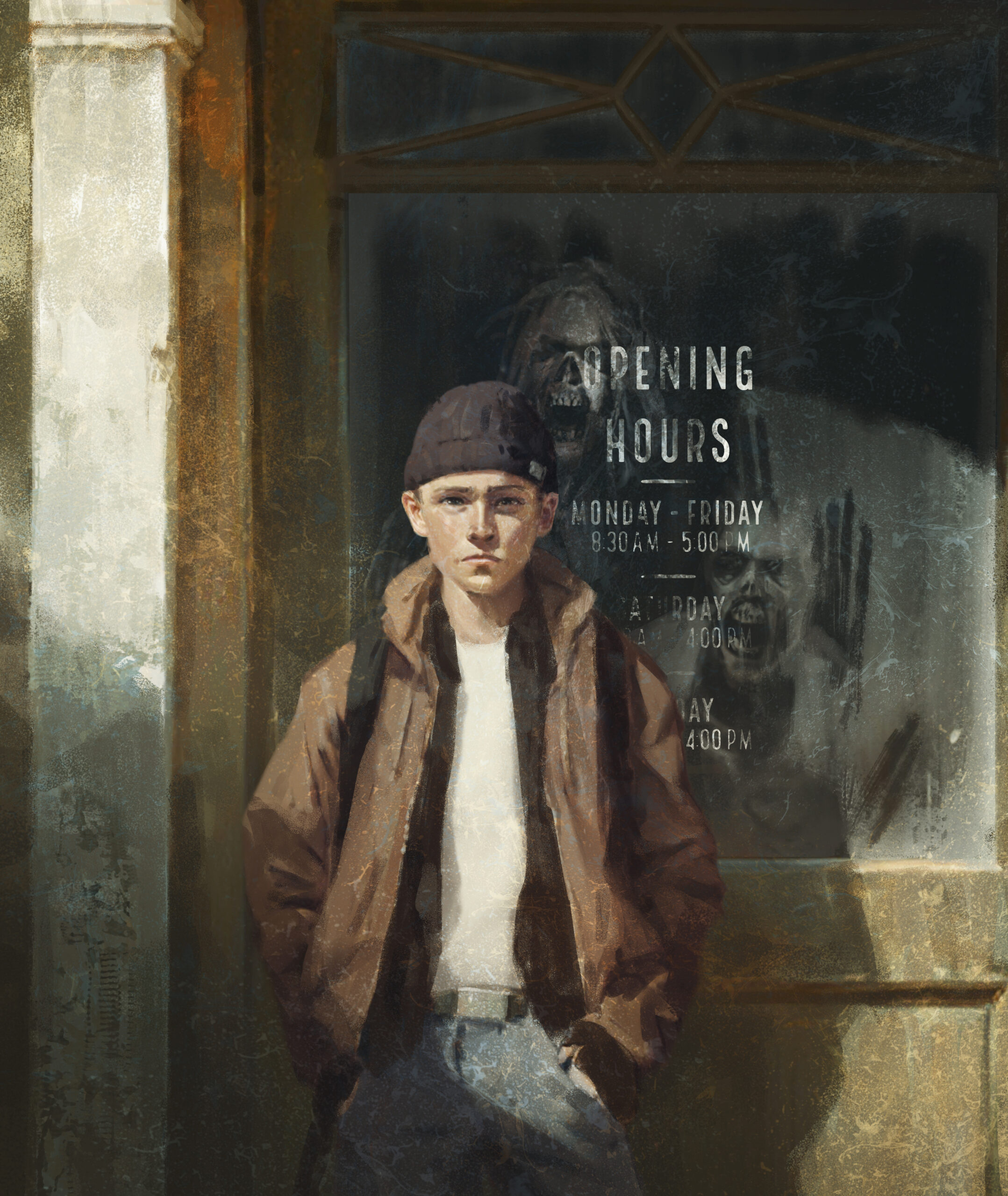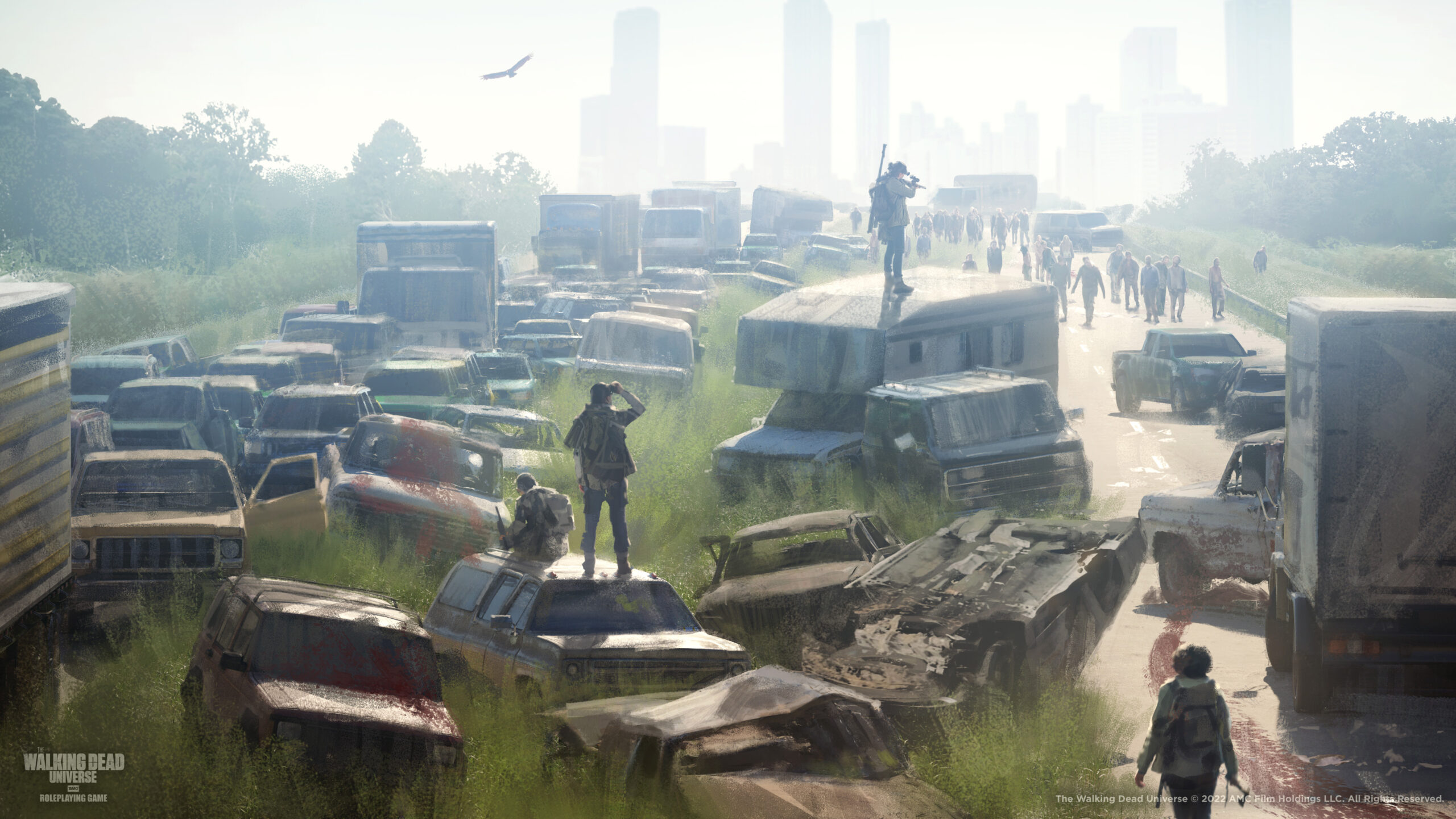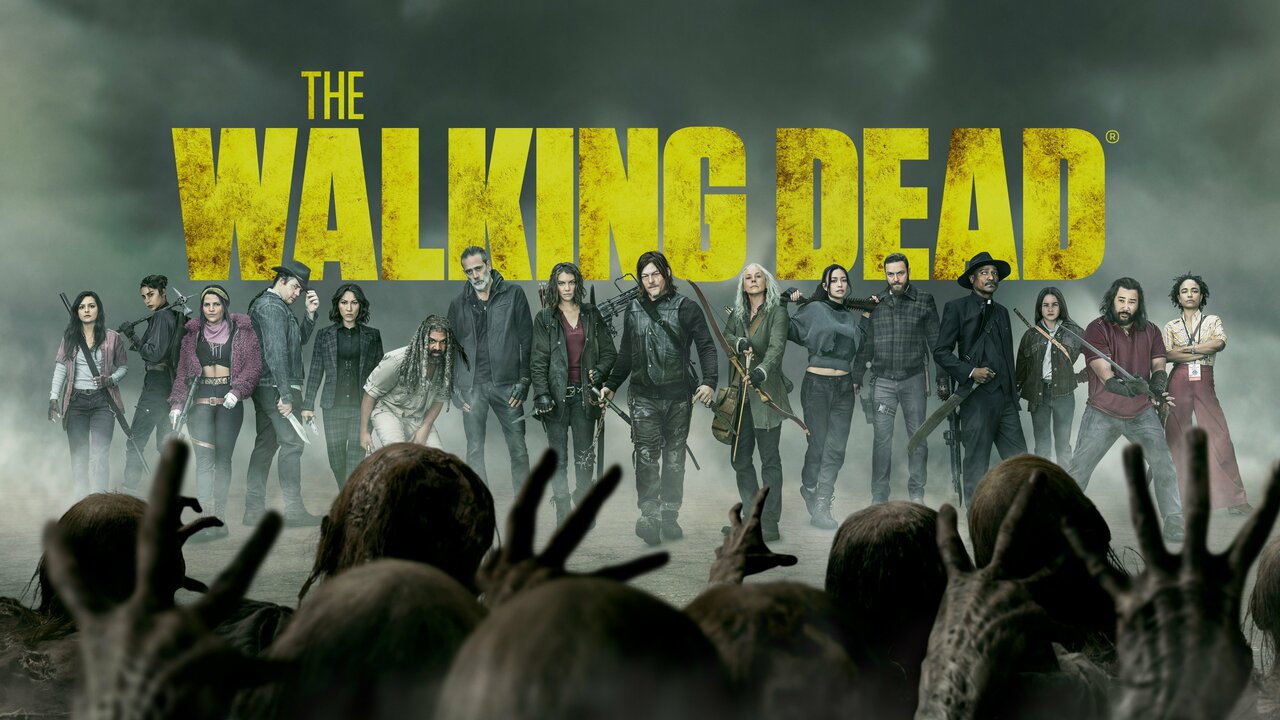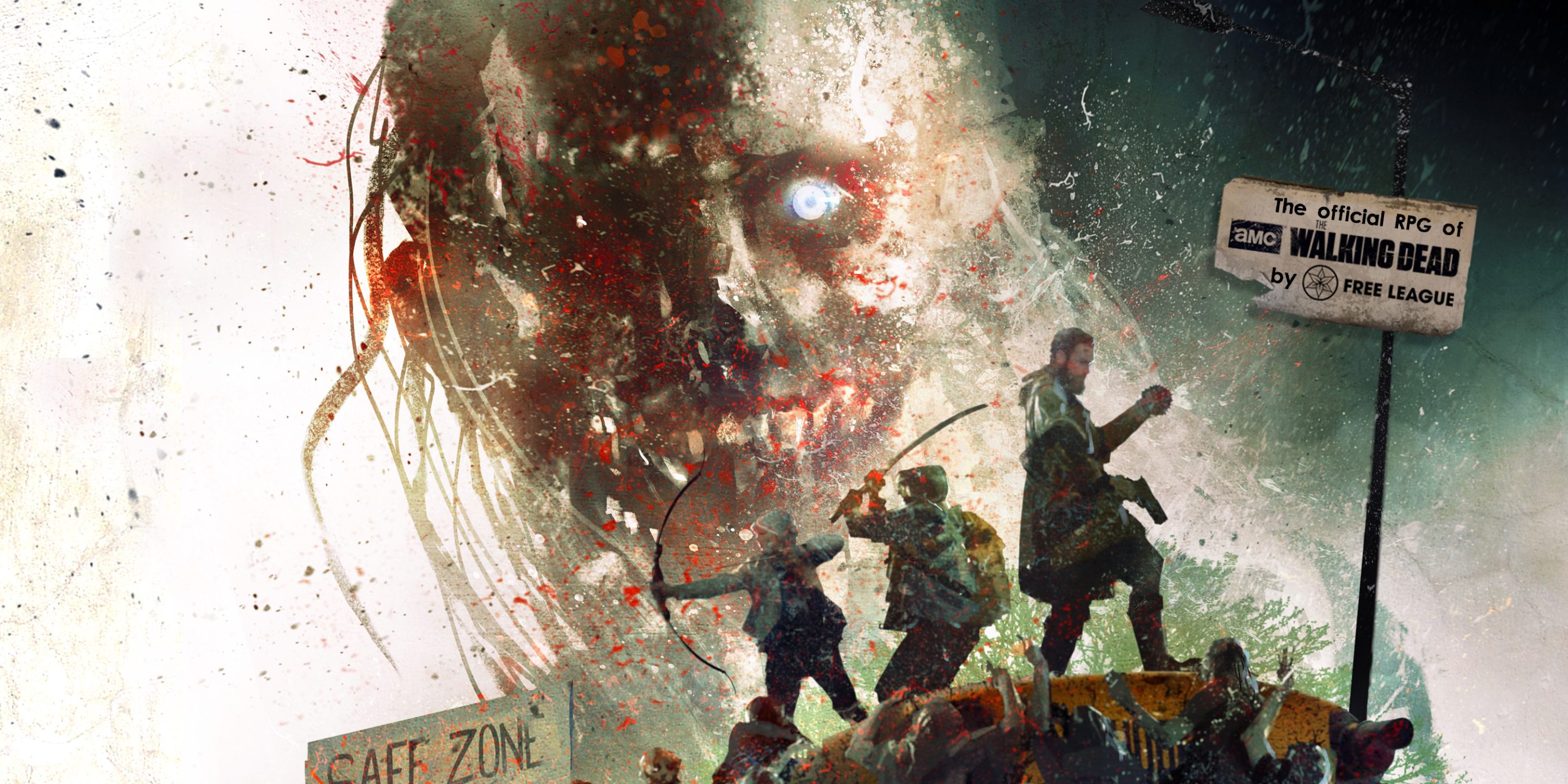The survivors are the real threat
 |
| The Walking Dead Universe © 2022 AMC Film Holdings LLC. All Rights Reserved. |
[10 min read]
The Walking Dead Universe is a top-tier intellectual property for me (see my ranking here) even if not all of its eleven seasons were as great as the first few. So when the opportunity to back it on Kickstarter appeared in March 2023, I went in on both the physical and digital editions of the starter set and the core rulebook, and the Foundry Virtual Tabletop versions as well.
My play experience
I played the short sample adventure from the core rulebook, The Golden Ambulance, both solo on Foundry VTT, and with my in-person group as a four hour one-shot. I really liked this scenario as an intro to the game and its simple structure fits perfectly for one session of play. Essentially the players are trying to recover medical supplies for the sick members of their community back at the haven, when they spot an ambulance on the top floor of a walker-infested parking garage. Naturally it is not as simple as avoiding or defeating the walkers - as in the series, other survivors are the real threat.
I then went on to solo play (using Foundry) the first two acts of a three act adventure from the starter set, The Wolves' Den, before switching to a more free-form, emergent story using the solo rules included in the core rulebook. I really enjoyed the free-form story, which I named "Alone in Atlanta", leveraging the excellent solo material found in the book and the pre-work I had put into trying different ways to play (my tips to solo roleplaying here).
After all of these various sessions, I can say I feel at ease with the system and appreciated the way it represented the source material. Given the popularity of the IP and the proximity to our modern day, these cultural touchstones make it an easy game for newer players to jump into.
You can see my raw notes from all my solo sessions here (WARNING, SPOILERS)
 |
The Walking Dead Universe © 2022 AMC Film Holdings LLC. All Rights Reserved.
|
What I liked
The simplicity
This is a modified version of Free League's popular Year Zero engine, but when compared to Alien RPG (
my impressions here), is a less crunchy version. I had players new to the system who had absolutely no problem adapting to it at the start of the session. The fact that combat is resolved in phases (rather than individual players acting in initiative order) could feel odd coming from D&D, but isn't difficult to run. This is a game focused on skills and items, and characters have only three health points, which feels appropriate to the setting where death is around every corner and you need your wits and gear to survive.
Walkers as an environmental hazard
One of the first things that jumped out to me was the fact that you never really engage in traditional combat with the titular enemies. Rather, they act as more an environmental hazard to overcome or a puzzle to solve than handling them individually as you might in other games.
For a simple example - mess up a Stealth check while moving past walkers and you might have a single walker attack to resolve as a consequence, but you can choose which skill to use to avoid the damage. e.g. Use Mobility to try and avoid the attack altogether, or use Close Combat to bash the walker before it can bite you.
If there is a group of walkers (called a swarm), you and your group describe how you want to overcome the obstacle and then roll a bunch of skill checks to try and overcome the total threat they represent. For a more complex example, let's take a situation where a swarm descends on survivors stuck on a ruined motorway: one player might stand on a car and bark orders, using Leadership to give others extra successes; another might thin the herd with some firearm shots using Ranged Combat; yet another might use Tech to set off a car alarm and try and pull some away from the road.
If the total number of skill successes meets or exceeds the total swarm threat number, either the obstacle is overcome, or the swarm threat is reduced for another round of skill checks. If the group fails, the swarm threat might increase, or they might suffer walker attacks, and still have to try again the next round.
All of this action would be narrated by the players and the game master using in-world fiction to animate was is essentially just an extended skill test system to overcome the walker threat.
 |
The Walking Dead Universe © 2022 AMC Film Holdings LLC. All Rights Reserved.
|
|
Foundry premium module
Disclaimer - I am a relative novice to Foundry VTT, and outside of
my brief dalliance with Pathfinder 2E this was my first experience buying a premium module for an RPG and really plumbing its depths. In a premium module, the rules, maps, non-player-characters (NPCs) and a host of digital assets are pre-configured to start using straight away.
I found this much easier than when I tried to solo Alien RPG just using physical books and dice. Having the rulebooks and notes all on the one screen, as well as characters and NPCs all statted up in easy-to-use digital sheets saved me a ton of time, and allowed me to to get to the fun fast with minimal setup.
I still had the physical rulebook in front of me and found it useful at times when I wanted to look something up and save some screen real estate. Side-note: I would actually suggest rolling physical dice and doing the calculations yourself if you are learning a new system, but since I had already played The Walking Dead in-person having the VTT handle all dice rolling with bonuses saved me time too. This is now my favourite way to play solo.
Rules for solo play
And speaking of solo - one of the stretch goals of this Kickstarter campaign was adding solo rules to the core rulebook for launch, and I am glad this was unlocked! For solo play, having house rules to help with survivability is important, but also suggesting a core gameplay loop can really help the player avoid feeling stuck or mentally blocked as to what to do next. I followed the loop below for my emergent story, and used the Yes/No oracle to help me make a ruling without a GM, and these in combination worked really well!
 |
| Rules courtesy of The Walking Dead Universe Roleplaying Game core rulebook by Free League |
Concerns I had
Presentation & layout
For the first time ever for Free League, I find myself levelling some negative criticisms of the presentation of their product. The main gripe being that the contents of the book seem to be spread out unnecessarily over multiple chapters. Case in point - all the rules for running NPCs are spread across three different chapters, necessitating the constant use of the index to find what you want.
My uneducated hypothesis is that since the kickstarter campaign unlocked different parts of the book as stretch goals over time, these extras were tacked on after the layout of the core rules were done. Either way, it made using the physical book more challenging than I expected. Add to that the quality of the binding being seemingly lower than other products, and it makes me hesitant to use the book frequently. On the other hand, the quality of the starter set was exceptional as usual for Free League.
A much more minor criticism is the art itself. The artist, Martin Grip, has a distinctive painterly style that I love, but that I think works better in The One Ring and Symbaroum. In the gritty, post-apocalyptic modern day setting of The Walking Dead Universe, while the art is still good, it doesn't seems to fit as well as the whimsical or dark fantasy settings of other products. Art is subjective of course, so your mileage may vary.
 |
The Walking Dead Universe © 2022 AMC Film Holdings LLC. All Rights Reserved.
|
GM fiat
The Year Zero engine is already fairly simple to use versus many crunchier D20 systems like D&D 5E and Pathfinder 2E. The adaptation of this engine for the Walking Dead Universe RPG is even more streamlined, leaving gaps that the GM needs to fill by make rulings on the fly. Please note this is coming from my perspective as a long time D&D player and Dungeon Master, and frankly I am excited to run simpler systems that require more improvisation at the table. But for some others, they might read the rules and wonder, where's the rest?
Longevity
Which brings me to my last concern - how long would this system interest me or my players? There isn't a lot of character progression, nor a huge list of items to strive for, so the goal really is about scraping a living together, and the relationships built between the survivors. This is thematically appropriate, and places the focus on how tough moral choices might play out in a bleak world.
Given the lethality of the system also, I think it suits more episodic or short series of play sessions rather than a long campaign. This is acknowledged in the rules by introducing survival mode scenarios - short adventures for one to two sessions using pre-generated survivors - and including one in the starter set. I think the game really shines in this mode of play.
For those interested in campaign mode, the driving motivation should be centred more around the survivors' haven and the safety of the community built around it than individual character progression. When tackling issues, challenges and projects for the haven, you might not mind losing your character to a random walker bite, since you can simply adapt an NPC from the haven that you had a relationship with as your new character. And I think this is the point - death is inescapable, but lives are not cheap. For campaign play, invest in relationships, harness the community and attempt to build something longer lasting than the character you play.
 |
Which of these survivors is your next character after your last perished?
The Walking Dead Universe © 2022 AMC Film Holdings LLC. All Rights Reserved.
|
|
What I would I bring to other systems
The concept of a haven in other RPGs is not new, and the 2024 revision of the D&D Player's Handbook will include a new
Bastion system to represent the player's home base. But I like the expression of this concept in The Walking Dead RPG - a collective of PCs and NPCs working to improve their chances of survival by upgrading their base. I run a version of this with Phandalin in my
Frontier Forays campaign, where the players have been working with a faction leader to improve the town's chances of surviving from an attack from a dragon and its minions. To flesh this out more like The Walking Dead, I could be more explicit in the relationships between townsfolk, the town's list of issues and prospective projects, allowing for meaningful choices between them and realistic consequences.
Hordes of enemies as an environmental puzzle is a concept pretty portable to D&D and other games. Rather than the tedium of running combat against a ton of small minions, why not have the players overcome them as a skill challenge, describing how they use their abilities to amass a certain number of successes? It might be faster and more cinematic than the alternative.
Final thoughts
The Walking Dead Universe RPG is a faithful representation of the TV series and a light system with heavy themes. If you're like me and never tire of the zombie apocalypse trope, and you find yourself looking for something easy to get into for some shorter scenarios, then I throughly recommend it.
"Oh, hell. I can see this is hard on you guys. I am sorry. I truly am. But I did say it. No exceptions!" Negan
 |
The Walking Dead Universe RPG, available now from Free League
The Walking Dead Universe © 2022 AMC Film Holdings LLC. All Rights Reserved.
|
|







From a 5e adaption point I think treating large hordes of monsters as an environmental challenge is interesting. Using skill challenges to resolve these encounters could be fun. I love the concept of skill challenges but as a DM I am still trying to find ways to implement them and get them right.
ReplyDeleteYeah, I have experimented with skill challenges - and some went better than others. Being clear it is a skill challenge from the start could avoid any confusion from players, especially if it is replacing a combat situation.
Delete